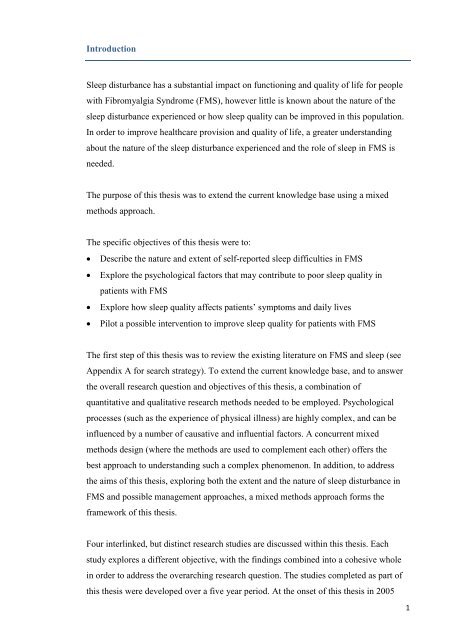Sick and Tired: Understanding and Managing Sleep Difficulties in ...
Sick and Tired: Understanding and Managing Sleep Difficulties in ...
Sick and Tired: Understanding and Managing Sleep Difficulties in ...
You also want an ePaper? Increase the reach of your titles
YUMPU automatically turns print PDFs into web optimized ePapers that Google loves.
Introduction<br />
<strong>Sleep</strong> disturbance has a substantial impact on function<strong>in</strong>g <strong>and</strong> quality of life for people<br />
with Fibromyalgia Syndrome (FMS), however little is known about the nature of the<br />
sleep disturbance experienced or how sleep quality can be improved <strong>in</strong> this population.<br />
In order to improve healthcare provision <strong>and</strong> quality of life, a greater underst<strong>and</strong><strong>in</strong>g<br />
about the nature of the sleep disturbance experienced <strong>and</strong> the role of sleep <strong>in</strong> FMS is<br />
needed.<br />
The purpose of this thesis was to extend the current knowledge base us<strong>in</strong>g a mixed<br />
methods approach.<br />
The specific objectives of this thesis were to:<br />
Describe the nature <strong>and</strong> extent of self-reported sleep difficulties <strong>in</strong> FMS<br />
Explore the psychological factors that may contribute to poor sleep quality <strong>in</strong><br />
patients with FMS<br />
Explore how sleep quality affects patients‟ symptoms <strong>and</strong> daily lives<br />
Pilot a possible <strong>in</strong>tervention to improve sleep quality for patients with FMS<br />
The first step of this thesis was to review the exist<strong>in</strong>g literature on FMS <strong>and</strong> sleep (see<br />
Appendix A for search strategy). To extend the current knowledge base, <strong>and</strong> to answer<br />
the overall research question <strong>and</strong> objectives of this thesis, a comb<strong>in</strong>ation of<br />
quantitative <strong>and</strong> qualitative research methods needed to be employed. Psychological<br />
processes (such as the experience of physical illness) are highly complex, <strong>and</strong> can be<br />
<strong>in</strong>fluenced by a number of causative <strong>and</strong> <strong>in</strong>fluential factors. A concurrent mixed<br />
methods design (where the methods are used to complement each other) offers the<br />
best approach to underst<strong>and</strong><strong>in</strong>g such a complex phenomenon. In addition, to address<br />
the aims of this thesis, explor<strong>in</strong>g both the extent <strong>and</strong> the nature of sleep disturbance <strong>in</strong><br />
FMS <strong>and</strong> possible management approaches, a mixed methods approach forms the<br />
framework of this thesis.<br />
Four <strong>in</strong>terl<strong>in</strong>ked, but dist<strong>in</strong>ct research studies are discussed with<strong>in</strong> this thesis. Each<br />
study explores a different objective, with the f<strong>in</strong>d<strong>in</strong>gs comb<strong>in</strong>ed <strong>in</strong>to a cohesive whole<br />
<strong>in</strong> order to address the overarch<strong>in</strong>g research question. The studies completed as part of<br />
this thesis were developed over a five year period. At the onset of this thesis <strong>in</strong> 2005<br />
1

















